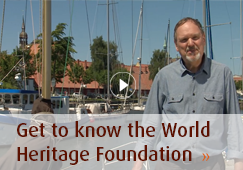The Foundation
There are currently more than 1,000 sites on the UNESCO World Heritage List. Many of these sites are insufficiently protected or even endangered. Some states are unable to nominate sites for the World Heritage List because of a lack of financial resources and/or the expertise needed to prepare a nomination.
The aim of the German World Heritage Foundation is
- to contribute to achieving balance in the World Heritage List
- to support the conservation of endangered World Heritage properties
In particular, the Foundation provides financially weak states with the opportunity to preserve and protect their cultural and natural heritage.
The German World Heritage Foundation was founded in April 2001 by the Hanseatic cities of Stralsund and Wismar. While drafting their own World Heritage nomination, both cities worked intensely with the concepts of the 1972 World Heritage Convention, the main principle of which is the shared responsibility of all people for the world’s cultural and natural heritage.
The World Heritage Foundation wants to actively contribute to this idea of global responsibility. The initiators of the nomination have first-hand experience of the complexity time and expense involved in the preparation of a World Heritage nomination. Many countries still lack the resources and know-how to create the documents required and in particular to ensure the protection of their heritage. This is one starting point for the German World Heritage Foundation.
The second approach is focussed on sites that have already been added to the World Heritage List, but whose heritage is inadequately protected and preserved for various reasons. This often comes down to the basic problem of insufficient financial resources but lack of interest from political leaders or lack ofknow-how, civil disorder or wars can also play an important role.
Initiators
The decision to create a World Heritage Foundation, was initiated by the Hanseatic cities of Stralsund and Wismar towards the end of 2000, shortly before the release of their own World Heritage nomination. This came about in response to the recommendations of UNESCO to contribute to the balance of the World Heritage List and to support sites in underrepresented states. The idea of creating a foundation was chosen because in contrast to one-off project donations, original capital is protected and new projects can be funded from the interest every year. The idea fell on fertile ground at the UNESCO in Paris and the German Commission for UNESCO.
In order for the World Heritage to be successful in the long-term, the gradual increase in endowments through further partnerships is vital, as well as the generosity of all those who care for the protection of the world’s heritage.
Foundation members
Board
Thomas Beyer
Mayor of the Hanseatic city of Wismar
Dr.-Ing. Alexander Badrow
Mayor of the Hanseatic city of Stralsund
The Foundation chairmanship rotates every three years between the two boards.
Board of Trustees
- Dr. Birgitta Ringbeck (Chairwoman)
- Dr. Rosemarie Wilcken
- Dr. Hans Caspary
- Prof. Dr. Bodo Wiegand Hofmeister
- Dr. Rico Badenschier
- Prof. Dr. Maria Böhmer
Foundation Office and Administration
Corinna Boeken


